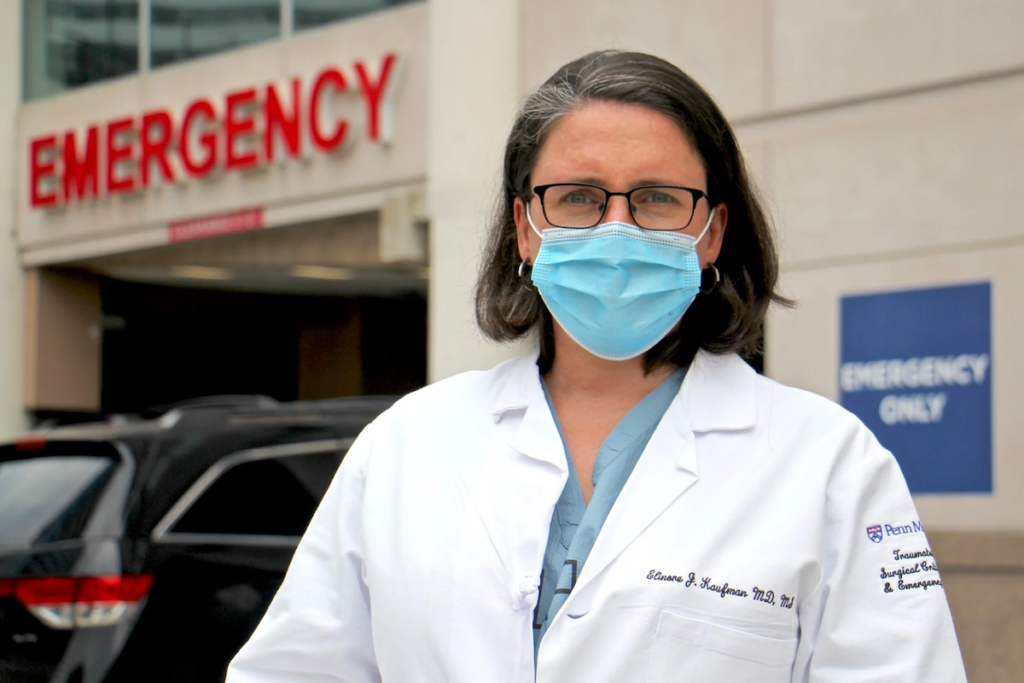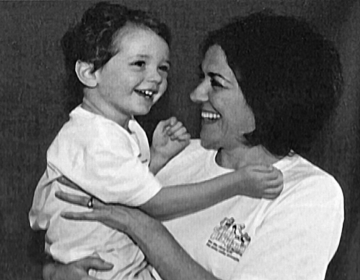Philadelphia hospital program adds psychologists to bridge mental health services for trauma survivors
The new psychology team at the Penn Trauma Violence Recovery Program has already provided about 46 survivors with short- and long-term therapy.
Listen 6:04
A group of kids from the Southwest Philadelphia Healthnastics program, ages 3-18, held signs at a protest demanding the Kenney administration do more to address gun violence in the city on Aug. 4, 2021. (Kimberly Paynter/WHYY)
This story is from The Pulse, a weekly health and science podcast.
Find it on Apple Podcasts, Spotify, or wherever you get your podcasts.
Trauma surgeon Elinore Kaufman says it’s always a good day when her patients make it out of the hospital alive.
“The thing that makes us the happiest is when we get someone back home,” Kaufman said.
But often, she worries about these patients, the lucky ones, who survive serious and violent injuries only to face the psychological aftermath of their trauma once they return home.
“The effects are more than physical,” Kaufman said. “There are absolutely emotional, psychological, social, economic effects for the individual and all of those same effects that kind of spread across the family and the community.”
But Kaufman knows that when people look for help in dealing with these symptoms once they leave the hospital, they face a number of barriers: a shortage of mental health care providers, long waiting lists for appointments and the high cost of therapy and medications.
To better meet the mental health needs of trauma survivors, the Penn Trauma Violence Recovery Program at Penn Presbyterian Medical Center in Philadelphia has added a new team of four psychologists to ensure that patients are connected to care options before they leave the hospital.
As of February, the new service has provided about 46 patients with outpatient short- and long-term therapy.
“Our patients are seeking care and we’re able to meet that need directly with no barriers,” Kaufman said. “No financial barriers, no logistical barriers.”

(Emma Lee/WHYY)
About one in five people who need emergency medical care at Penn Presbyterian Medical Center are victims of gun violence. Others come in with violent injuries from an assault, a car crash or another serious accident.
After traumatic incidents like these, many people have some symptoms of post-traumatic stress. Most go on to recover from these symptoms with little or no intervention.
“Some patients want and need a very short-term type of therapy and that can be very, very helpful,” said Lily Brown, psychologist and director of the University of Pennsylvania’s Center for the Treatment and Study of Anxiety.
Others leave the hospital and experience more extreme symptoms that can become debilitating or chronic, especially if they are returning to an unsafe home environment.
“Trauma exposure can dramatically shift how they see themselves, how they see other people, and how they see the world,” Brown said. “So, some survivors of trauma will start to feel incompetent, will start to feel like they are to blame for the trauma happening.”
The psychologists who’ve joined the Penn Trauma Violence Recovery Program specialize in treating post-traumatic stress disorder.
Subscribe to The Pulse
They use prolonged exposure therapy to help people process and heal from their trauma. Brown said it’s a specific type of cognitive behavioral therapy that guides patients through their memories and feelings as they retell the story of their traumatic injuries and experiences.
“Because what happens for PTSD is, survivors of trauma are harassed by these intrusive memories of the trauma and their initial reaction is, ‘I don’t want to think about this. I’m going to try to distract myself and not think about it,’” said Brown.
Brown said it’s nearly impossible to predict which patients will go on to develop clinical PTSD and which might need just a little help in transitioning back home.
That’s why the trauma recovery psychologists meet with as many patients as possible before they leave the hospital so that they can build trust and ensure that these survivors immediately get connected to care options when they return home.
The Penn Trauma Violence Recovery Program, which Kaufman co-founded in 2021, is also staffed by recovery specialists who aid patients in their physical recovery and provide social services like legal support, employment, housing and more.
The program is just starting to collect data in order to analyze the effectiveness of the additional psychology services, but Kaufman says they’re already seeing positive outcomes.
In one case, she says a woman who had survived terrible trauma went on to develop severe PTSD. Because of the violence intervention program, psychologists were able to provide this person with outpatient mental health care nearly every day.
“The therapist was able to get back to us this weekend and say, ‘Hey listen, this patient, she’s not all the way better yet, but she’s gone from that highest possible category of severity to still severe, but a notch below. She hasn’t thought about suicide in two weeks,’” Kaufman said. “And maybe we can say now that collectively we’ve saved her life twice – once from her injuries and once from the mental health consequences of her injuries.”
Kaufman said these hospital-based violence intervention programs are growing in number. The one at Penn drew on expertise from well-established programs at Children’s Hospital of Philadelphia, Medical College of Wisconsin in Milwaukee and Healing Hurt People at Drexel University.
As it becomes clearer that this approach can reduce the severity of post-traumatic stress and lead to better recovery outcomes, Kaufman hopes more hospitals, communities and organizations invest in developing programs of their own.
WHYY is your source for fact-based, in-depth journalism and information. As a nonprofit organization, we rely on financial support from readers like you. Please give today.






